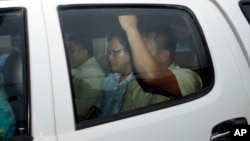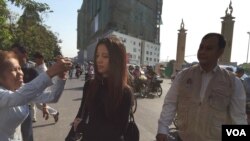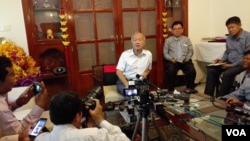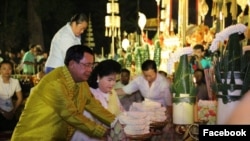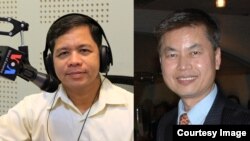The government of Cambodian Prime Minister Hun Sen sustained a barrage of criticism following the imprisonment this week of four human rights workers and a member of the National Election Committee (NEC), in a case widely seen as politically motivated.
Human Rights Watch called on Cambodia’s aid donors and the United Nations to “stand together” against the Hun Sen government’s legal “maneuvers,” which it said were intended to “intimidate and clamp down on Cambodia’s courageous human rights advocates.”
“No one should mistake these prosecutions for anything other than Prime Minister Hun Sen’s effort to undo decades of work by Cambodian groups and the UN,” Brad Adams, Asia director for Human Rights Watch, said in a statement on Tuesday.
On Monday, the Phnom Penh Municipal Court detained ahead of trial four staff members - Nay Vanda, Ny Sokha, Yi Soksan, and Lim Mony - of the respected local rights group Adhoc, as well as Ny Chakrya, deputy secretary-general of the NEC.
UN human rights monitor Soen Sally was also charged in absentia, but is currently under the protection of the UN in Cambodia.
All six were accused of bribery by government investigators who are spearheading an unprecedented probe into an alleged extra-marital affair involving Kem Sokha, the deputy leader of the opposition Cambodia National Rescue Party (CNRP). The probe was launched following the release of Kem Sokha’s private phone conversations, which were apparently electronically tapped.
UN spokesman in New York Farhan Haq told VOA Khmer this week that the charges against Soen Sally of the UN’s High Commissioner for Human Rights office, has been raised with the government.
“We have informed the Government that Mr. Soen Sally is a UN official and that the issue concerns the performance of his official functions for the Office of the High Commissioner for Human Rights in Cambodia.”
“The Government was informed that, accordingly, Mr. Soen Sally was immune from legal process in respect of this matter,” he said.
Some observers see comparisons between Kem Sokha’s case and that of former royalist party leader Prince Norodom Ranariddh, who was one of the first people ever charged in 2007 under an adultery law, newly-introduced at the time by the government. The case against Ranariddh also was seen by observers of Cambodian politics as politically motivated.
The investigation of Prince Ranariddh’s relationship with his long-term partner Ouk Phalla, and to whom he is now married, added to the Prince’s legal woes, which forced him to leave the country, and came just ahead of nationwide commune elections in 2007.
Opposition party members and political observers believe the latest round of legal action against the political opposition and government critics is part of a wider effort to silence dissent ahead of commune elections in 2017 and national elections in 2018.
Having maintained an iron grip on power for more than 30 years, Hun Sen’s ruling Cambodian People’s Party (CPP) suffered its greatest electoral defeat at the last national election in 2013, dropping its share of seats in parliament from 90 to 68. The CNRP, led by Sam Rainsy and Kem Sokha, won 26 additional seats to give them a sizeable minority presence of 55 seats to the CPP’s 68.
In recent months, however, legal cases brought by the government have seen Sam Rainsy choose self-imposed exile to avoid arrest, and the arrest and jailing of several members of his party in Cambodia.
In a rare public demonstration of support, members of the Phnom Penh diplomatic corps posted photographs on social media standing alongside leaders of the country’s embattled civil society organizations.
Hun Sen has defended his government’s actions, and warned the international community to stay out of Cambodia’s affairs.
“Foreigners, please do not interfere into Cambodia’s internal affairs,” Hun Sen said in a May speech, during which he also warned critics that there are limits to freedom of expression.
“Cambodia does not interfere in other countries’ internal affairs… please respect the independence, integrity, and sovereignty of Cambodia, don’t disturb at all,” he said.
And for domestic critics, he had this: “Boundaries and freedom you share with others. You violate, and you are responsible before the law. We will take action without any delay to defend the credibility and the dignity of our Cambodian People’s Party and the Royal Government.”
Yong Kim Eng, president of the People’s Center for Development and Peace in Phnom Penh, told listeners of the Hello VOA radio call-in program on Thursday that there would be costs involved for the government – and investment – due to the atmosphere of fear and restrictions on freedom of expression.
“When people worry and are scared of speaking out, they dare not speak the truth. Then the Government and State institutions involved do not receive comprehensive information. On the other hand, civil society helps the government in filling gaps in implementing projects effectively.”
Yap Kim Tung, president of Virginia-based Cambodian Americans for Human Rights and Democracy, who also spoke on the Hello VOA radio program, said Cambodia would be isolated politically and economically if human rights and freedom of expression are not seriously respected.
“Leaders in the US and, especially, in the EU, are not happy because they have the standard that listens to the people. When leaders in Cambodia do not listen to the people, they will not want to do businesses with or be associated with that in the US as well as the EU.’’
Cambodia’s leadership should also weigh the cost of denying the people a voice, said Yap Kim Tung.
“If the leaders do not respect us, next time we don’t vote for them. And if they dare to threaten us, next time we don’t vote for them. If they don’t listen to us, next time we don’t vote for them,” he said, adding that voters, as taxpayers, had a right everywhere to hold their government accountable.
Both Yong Kim Eng and Yap Kim Tung said Cambodia still needs billions of dollars in loans and assistance each year and should, therefore, improve State institutions, especially the judicial system, to win the confidence of the Cambodian people.
Yong Kim Eng also urged politicians from the CPP and CNRP to return to negotiations and restore the culture of dialogue in order to ease the current political tension.
Ordinary people should also actively engage in politics in order to help reform the country, he added.




